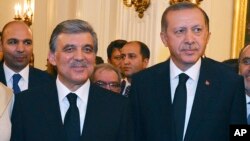Outgoing Turkish president Abdullah Gul has made it clear that he intends to stay in politics.
The long time ally of President-elect Recep Tayyip Erdogan is now increasingly seen as a political rival and even threat to Erdogan. But to his supporters, Gul is seen as a force of moderation amid growing concerns over the direction the country is heading.
The last few days of Gul's tenure have been marked by controversy. The pro-government media that often supports him has launched a sustained attack against him, accusing him of betraying Erdogan.
That prompted Gul's wife Hayrunnisa to criticize the journalists and declare a fight against her husband's growing number of critics from the ruling AK party.
Gul and Erdogan have been political comrades since the 1990s. But Assistant Professor Yuksel Taskin of Istanbul's Marmara University says the political partnership that dominated Turkish politics for decades is at an end.
"There is a tension between Gul and Erdogan, because clearly he [Gul] had the expectation he would be the prime minister again," Taskin said. "However, Erdogan had an idea to purge the founders of the party and implant a new group of politicians in their late thirties and early forties. I don't think Gul is happy with Erdogan's leadership."
Erdogan's decision not to choose Gul might have been colored by his increasing lack of trust in his former ally.
The outgoing president has increasingly voiced concern and criticism about the direction Turkey is heading, and its backing of rebels against the Syrian regime.
Despite the tensions between the two men, Gul has enjoyed support across the deeply polarized political landscape, says Asli Aydintasbas, a columnist for the Turkey's Milliyet newspaper.
"Gul is able to generate votes beyond the AKP base and beyond activists, is appreciated by Kurds, and even social democrats for his position on basic freedoms and what not," Aydintasbas said.
Erdogan faces a political challenge that could result in needing Gul in upcoming elections when Ahmet Davutoglu is in the office of prime minister. His AK Party needs to secure a two-thirds parliamentary majority in next year's general election in order to change the constitution to turn Turkey from a parliamentary to a presidential system.
"If we go to the elections when they are scheduled in June and Davutoglu makes a mess of things and it becomes obvious without Gul at the helm of the party you really cannot run in the elections and get the majority you need, under those circumstances Gul would be expected to be called back," said Soli Ozel, an international relations expert at Istanbul's Kadir Has University.
Opponents of the AK party drawn from conservative wing of Turkish politics are suggesting Gul could even form a new party.
"He [Gul] is very silent," Taskin said. "He is trying to decide whether to join the initiative to start a center right party. So there are some groups willing to start a new party, but Gul is still indecisive to openly support such an initiative."
Gul's final decision could depend on the success of the new government and its prime minister. For now, the outgoing president has refused to comment on his future plans other than saying he does not plan to retire from politics.




